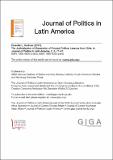| dc.contributor.author |
Druscilla Scribner |
| dc.coverage.spatial |
United States |
| dc.date.accessioned |
2016-01-07T15:29:13Z |
| dc.date.available |
2016-01-07T15:29:13Z |
| dc.identifier.uri |
http://desa1.cejamericas.org:8080/handle/2015/3569 |
| dc.description.abstract |
Most analyses of the judicialization of politics focus on judicial policy-making and rights creation; however when judicialization of politics unfolds in a separation of powers political context courts are also involved in distributing power. The task of power delineation among branches of gov- ernment is different from policy-making or rights adjudication. Judicializing political disputes about power gives courts the opportunity to alter the balance of institutional power, to create stronger executives (or legislatures) and a stronger (or weaker) role for themselves. To illustrate these points, this article examines how the Chilean Constitutional Tribunal (TC) adjudicated a specific type of separation of powers conflict between the Legislature and the Execu- tive from 1990-2005. The analysis of the TC doctrine overtime highlights how the TC has shifted the balance of power in the policy-making process and augmented its influence within the political system. |
| dc.language.iso |
English |
| dc.title |
The Judicialization of (Separation of Powers) Politics: Lessons from Chile |
| dc.ceja.source |
Fuente: Journal of Politics in Latin America |

